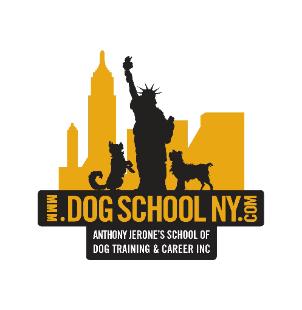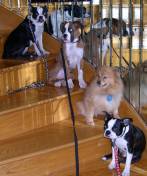Full-Time Program: 6 weeks
Monday – Friday
Morning class is 9:00 am to 12:00 pm or
Evening class is 6:00 pm to 9:00 pm
Part-Time Program: 10 – 12 weeks
Monday, Wednesday, & Friday
Morning class is 9:00 am to 12:00 pm or
Evening class is 6:00 pm to 9:00 pm
Program Tuition: $4495 * (plus housing if needed)
***Call for group rates***
Dog training course breakdown:
COURSE OUTLINE
Professional Dog Trainers course – 6 weeks
This six week course of teaching prepares students to work with a wide diversity of dogs, and dog temperaments utilizing numerous training techniques. Graduates may find appropriate employment in veterinary clinics, obedience clubs, private dog training companies, and possibly open up their own dog training company. Students will learn to obedience train and work with
behavior problems using classical and clicker techniques. Upon completion for this program, students will receive the certificate of Certified Dog Trainer and will be able to carry out private lessons, and group lessons.
• Learning Theory
In these classes students will be instructed in how dogs learn and introduce to different training equipment. Students will
learn:
1. The knowledge behind how dogs learn.
2. Application of psychological values in dog training.
3. When to use different training equipment.
• Basic Dog Obedience
In these classes students will be introduced to basic dog obedience theory and practical
application. Students will learn:
1. How to properly approach an unfamiliar dog.
2. Bite prevention training.
3. How to build a good relationship with a dog.
4. Basic obedience exercises (sit, down, heel, no, come, stay, okay, automatic sit).
5. Appropriate use and function of different types of training equipment.
• Fundamental Clicker Training
In these classes students will be introduced to clicker training concepts. Students will learn:
1. Principles of clicker training.
2. Benefits and disadvantages of a clicker.
3. How to introduce a dog to the clicker.
4. Use of a clicker in training basic pet tricks.
• Fundamental Principles in Behavior
In these classes students will be introduced to essential canine behavior and behavior
modification techniques. Students will learn:
1. Methods of dealing with behavior problems.
2. Prevention of behavior problems in dogs.
3. How to use different techniques to solve behavior problems.
4. How to use a clicker in combination with solving behavior problems.
5. How to deal with ordinary behavior problems like pulling, jumping up, barking, and more.
• Puppy Imprinting, Socialization, and Selection
In these classes students will be introduced to puppy imprinting, socialization, and selection.
Students will learn:
1. Puppy proofing your home.
2. Crate training techniques.
3. Selecting the right puppy.
4. Prevention of behavior problems.
5. The critical socialization an imprinting period from neonatal to transitional to domestication.
6. How to temperament test puppies.
7. Bathroom etiquette techniques.
8. Puppy kindergarten training.
9. The use of voice tones to interact with puppies.
• Private Lessons
In these classes students will be introduced to private lesson teaching. Students will learn:
1. How to teach customers and their dogs in basic obedience training.
2. The fundamentals to giving a private lesson.
3. How to deal with difficult clients.
4. Give private obedience lessons to others.
5. Make a lesson plan for private lessons.
6. The correct way to introduce dogs to each other.
• Introduction to Protection Training
In these classes students will be introduced to the skill of protection training.
Students will learn:
1. Pros and cons of offering protection training
2. Evaluating and selecting a dog for protection training
3. Methods in training a protection dog
4. Safety and control of a protection dog
5. How to distinguish and build up a dog’s drives
• Group Classes
In these classes students will be introduced to group lesson teaching. Students will learn:
1. Why clients drop out of obedience class.
2. The different types of group classes to offer.
3. How to conduct a group class.
4. How to teach customers and their dogs in basic obedience training.
5. How to perform training evaluations.
6. Make a lesson plan for group classes.
7. The correct way to introduce dogs to each other.
*** (Group training in basic obedience. Each student will participate with a dog within a group setting of other students and dog teams; their ability to over ride distractions for example, other dogs presents may cause a dog to be dominate, fearful, submissive and hyperactive. This group training will teach the students when to apply praise and correction when needed in order to correct bad behavior and motivate good behavior. Groups may include up to eight dogs and handlers, like a formation, Group training teaches a dog how to be a canine good citizen. Thanks to the students patience, perseverance, perspiration)
• First Aid For Dogs
In these classes students will be introduced in canine first aid. Students will learn:
1. CPR for dogs.
2. How to administer basic first aid.
3. How to recognize a medical emergency.
• Advanced Dog Obedience
In these classes students will be instructed in advanced dog obedience theory and practical
application. Students will learn:
1. Teach a dog to do basic off-leash obedience exercises.
2. Teach a dog to complete the AKC Canine Good Citizen exam.
3. The use of hand signals.
4. Problem Solving
5. Obedience training under distractions.
6. Built distance on communications.
• Advanced Clicker Training
In these classes students will be introduced to clicker training concepts. Students will learn:
1. How to switch to a variable reinforcement schedule.
2. When to fade the use of the clicker and when to bring it back in.
3. Clicker training for therapy and service dogs.
• Company Techniques
In these classes students will be introduced to basic business techniques. Students will learn:
1. Naming your business.
2. Pros and cons of owing your own business.
3. Essential needed for starting your own business.
4. Choosing a site for your business.
5. Risk management.
6. Where to turn for help.
7. Advertising and promotional strategies.
8. Using public affairs to advance your business.
9. Cost effective advertising through the internet.
10. Closing the sale.
• Doggie Boot Camp:
Doggie Boot Camp is one of our marketing programs that we offer. It teaches the skills in public relations and to create a more positive relationship. It’s conducted in a group setting at a park starting there third week.
Read testimonials See Graduates Web Sites Enroll Now








